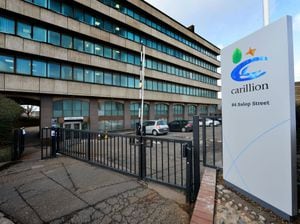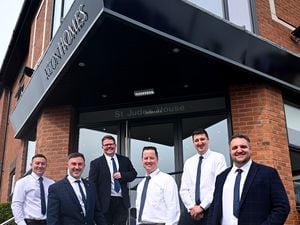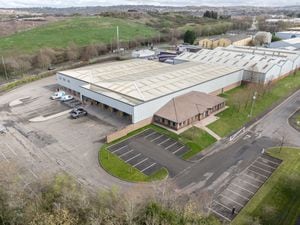Carillion collapse: How the mighty have fallen
In the days since the collapse of Carillion, the failed Wolverhampton construction and services group has become a political hot potato.

The Government is facing questions over why it continued to push work Carillion's way even after it became clear the company was in trouble.
And Labour has seized on the Wolverhampton company's 450 Government contracts as a weapon to beat the current administration over the head for the perceived failings of public private finance initiatives and the evils of outsourcing public sector work to private sector companies. Ignoring, of course, the way the last Labour administration seized on PPI as a way of paying for public projects while kicking the bill down the road.
What all these political shenanigans obscure, of course, is that what we have here is one of the biggest, thorniest and potentially painful business failures in years.

As well as the 19,500 Carillion staff in the UK, including the 400 at the company's city centre headquarters in Wolverhampton, there are the thousands of people working for sub contractors and suppliers who now face redundancy as a by-product of Carillion's collapse.
Despite the shock at the end – no one had predicted liquidation, only administration – the warning signs have plainly been there to see for more than a year and a half.
While Carillion didn't admit there was a serious problem until July, when it revealed it was having to slash the value of contracts that had gone wrong by a staggering £850 million, a lot of people in the City had been betting against the company for more than a year.
They are called 'short-sellers'. It's a complicated process but basically if they think a company's stock is going to fall, the borrow some from a big shareholder like a pension fund, wait for the drop and then sell them back for, hopefully, a hefty profit.
Carillion had been the most shorted stock on the London Stock Exchange for months on end. The smart money in hedge funds and elsewhere was betting against the company, because some detailed research had suggested the company was riding for a fall.
Short sellers look for weaknesses other investors have missed, and after Carillion failed to persuade Balfour Beatty to agree to a merger in 2014 several analysts started going through its financial statements with a fine toothcomb
What they found convinced they this was a share worth shorting. They believed Carillion's long term contracts often involved over-optimistic guesswork on revenue and costs while 'trade receivables' – money it was owed but hadn't been paid – had been rising as sales slipped.

And it was bidding too low to win work. After chief executive Richard Howson stepped down after the profit warning in July, his temporary replacement Keith Cochrane was brutally frank. As he tried to pull together a rescue plan, Mr Cochrane said the company "took on too many unprofitable contracts".
"In too many cases we were building a Rolls-Royce but only getting paid to build a Mini," he said.
Despite all this, unveiling its full-year results in March the company presented a plan to cut debt, declaring it had a “good platform and clear strategy to develop the business”.
But there was suspicion that Carillion's aggressive management of payment terms with suppliers, which eventually made them wait up to 120 days for their money, was suggesting a company with substantial debts that might be struggling to generate cash flow.
The City 'short-sellers' and hedge funds have come in for some criticism over the last year, with some feeling they were taking advantage of a struggling Carillion. But they were right and nearly everyone else was wrong. Unfettered capitalism, in the shape of the stock market, proved more effective than all the other safety nets in detecting a wrong'un.
And it is clear that Carillion was not widely loved by the sub-contractors and suppliers who worked for it.

Walter Howells now runs Howells Patent Glazing, in Cradley Heath, but he is a building industry veteran of 50 years. He said: "Carillion were reviled among subbies. There will be those who are dancing on its grave. They were always late paying, it was always 120 days. You got the impression their accounts department's job was to delay payment as long as possible. They were always the same, even when they were part of Tarmac.
"The company spent £54m changing its name to Carillion and we all said that money should have been spent paying the subbies. We only worked for them twice, that was enough. Never again."
Questions clearly still need to be asked. Even before it collapsed, Carillion was under investigation by the City watchdog, the Financial Conduct Authority, about the content of its announcements to the City over the seven months leading up to its first profit warning in July. They gave no hint of the crisis to come. If Carillion was found to be at fault it could face unlimited fines, if there is any money left to pay them.
That's not to let the Government off the hook. After all, its decision to keep pushing hundreds of millions-worth of contracts in Carillion's direction last year will have encouraged suppliers and sub-contractors to keep working for the company, work for which they will in all likelihood never be paid.
Meanwhile the Official Receiver is carrying out its own probe into the conduct of directors, "past and present". And Business Secretary Greg Clark has asked that the investigation be fast-tracked and extended in scope.
Nobody forced Carillion to build up enormous debt, to impose harsh payment terms on its sub-contractors and suppliers, or to bid too little for multi-million building contracts that ended up making a loss. Those were choices made by its bosses, and go towards explaining why the company had just £29 million in the bank when it failed, but owed billions in debt, pension deficits and unpaid bills to its supply chain.
That's not a failure of Government policy. That's a failure of management.





